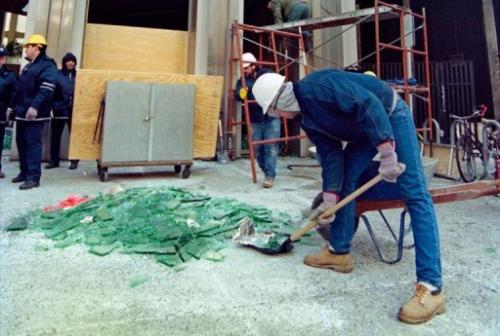
Russia starts a big rescue and clean-up operation involving more than 9,000 workers in the Ural Mountains following Friday’s meteor strike, Emergencies Minister Vladimir Puchkov says.
President Vladimir Putin ordered the operation to help some 1,200 people who were injured, including 200 children, mostly by shattered glass.
The shockwave damaged an estimated 200,000 sq m (50 acres) of windows.
Russian officials put the cost of the damage at about 1billionn roubles ($33 million).
A fireball had streaked through the sky on Friday, followed by loud bangs.
A large fragment reportedly landed in a lake near Chebarkul, a town in the Chelyabinsk region. A Russian army spokesman said a crater 6 m (20 ft) wide had been found there.
An emergencies ministry spokeswoman said a group of six divers would inspect the waters for the presence of pieces of a meteorite.
Vladimir Puchkov toured Chelyabinsk city on Saturday to assess the damage.
He said: “We have a special team working… that is now assessing the seismic stability of buildings. We will be especially careful about switching the gas back on.”
More than 9,000 people are working to clear up the damage in the Chelyabinsk region. Most are locals, but some 1,800 people came from neighboring regions.
Vladimir Putin said he had thanked God that no big fragments of the 10-tonne meteor – which was thought to be made of iron and travelling at some 30 km (19 miles) per second – had fallen in populated areas.
It had entered the Earth’s atmosphere and broke apart 30-50 km (20-30 miles) above ground, according to Russia’s Academy of Sciences, releasing several kilotons of energy – the equivalent of a small atomic weapon.
Vladimir Puchkov said there was no confirmation yet that any fragments had been found.
The emergencies ministry urged calm, saying background radiation levels were normal after what it described as a “meteorite shower in the form of fireballs”.

Some 50 people remain in hospital for treatment – mainly for cuts and bruises from shattered glass.
The Chelyabinsk region, about 1,500km east of Moscow, is home to many factories, a nuclear power plant and the Mayak atomic waste storage and treatment centre.
The shockwave blew out windows in more than 4,000 buildings in the region.
Regional governor Mikhail Yurevich said damage was estimated at 1 billion roubles but dismissed as a “journalistic spoof” reports in Russian media that people had deliberately shattered windows to claim on meteorite-related insurance.
Many children were in classrooms when the meteor fell at around 09:20 local time.
Video posted online showed frightened, screaming youngsters at one Chelyabinsk school, where corridors were littered with broken glass.
Scientists have played down suggestions that there is any link between the event in the Urals and 2012 DA14, an asteroid which raced past the Earth later on Friday at a distance of just 27,700 km (17,200 miles) – the closest ever for an object of that size.
Such meteor strikes are rare in Russia but one is thought to have devastated an area of more than 2,000 sq km (770 sq m) in Siberia in 1908.
[youtube baT22zk1yUQ